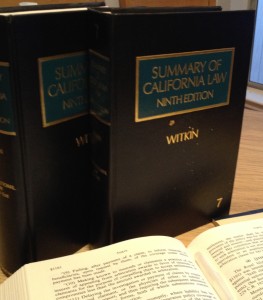Can An Attorney Have Liability to Non-Clients?
Generally speaking, a lawyer only owes a duty of care (and thus, can only be liable for malpractice) to a client, meaning “a person with whom the lawyer had an ongoing attorney-client relationship at the time the professional negligence was committed.”
However, under some rare circumstances, courts will impose a duty of care on a lawyer with regard to non-clients also. In the next few posts, we’ll take a look at the circumstances when a court might hold an attorney liable for malpractice even if the plaintiff was not a client.
In most cases, courts will only find a duty of care to non-clients:
(a) where the non-client individual (or entity) was an intended beneficiary of the lawyer’s professional services, OR
(b) where the harm to the non-client was clearly foreseeable and the facts and circumstances of the case outweigh the normal rules against holding lawyers liable to non-clients, OR
(c) where a statutory exception (a law) makes the non-client able to sue for malpractice under a given set of facts or circumstances.
FACTORS IMPACTING THE DECISION TO HOLD AN ATTORNEY LIABLE TO NON-CLIENTS
Before a court will find an attorney liable to non-clients, the court will often evaluate the following factors, to determine whether, under the specific facts of the case at issue, the non-client plaintiff was an intended beneficiary of the legal services and/or whether the circumstances weigh in favor of holding the lawyer liable:
1. Was the lawsuit, transaction, or other matter for which the attorney was hired intended to benefit, impact, or otherwise affect the (non-client) plaintiff? (And, as a connected question: how much did the lawyer know about the plaintiff and this anticipated benefit?)
2. How close is the connection between the defendant attorney’s conduct/malpractice and the non-client plaintiff’s harm or damage?
3. Was the non-client plaintiff’s harm foreseeable? If so, to whom, and how foreseeable was it?
4. Does a high degree of moral turpitude, or “blame,” attach to the defendant attorney’s conduct? (In simpler terms: how “badly” did the lawyer behave, with regard to the wrongful conduct in question and also with regard to the non-client plaintiff?)
5. What is the likelihood that punishing this attorney (meaning, holding him or her liable for professional negligence in the case of the non-client plaintiff) will prevent future harm — both by this defendant attorney and by others in similar circumstances?
6. Would finding the defendant attorney guilty impose an unreasonable or unfair burden on this or other attorneys with regard to addressing and anticipating the needs of non-clients?
7. Would imposing liability on the attorney interfere with this attorney’s (or other attorneys’) ability to provide proper representation to their actual clients (in this case and/or in future cases)?
As you can see, the decision to impose malpractice liability for the impact an attorney’s actions have on a non-client plaintiff involves much larger questions than merely the proper and zealous representation of the attorney’s own clients. Every time a court imposes malpractice liability on a lawyer for actions that impact people (or businesses) other than the attorney’s own clients, the court steps onto a slippery slope that requires attorneys to consider their actions more broadly — and may also impact lawyers’ willingness to represent clients at all. This is why courts impose such liability on lawyers only in rare circumstances.
In the next few posts, we’ll examine these circumstances in more detail.
If you believe an attorney committed malpractice for which he or she should be held liable to you, even though you were not the lawyer’s client, consult an experienced malpractice attorney immediately. Failure to act promptly could result in the loss of your legal rights.
*Never use this or any other article as a substitute for qualified legal representation. Consult a lawyer immediately if you think you have a malpractice claim, or any other legal claim or lawsuit.
















